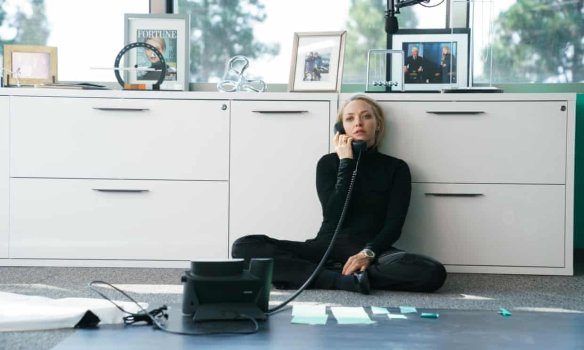In the jaw-dropping saga of disgraced health-tech entrepreneur Elizabeth Holmes, there was one aspect that attracted most of the public’s attention: her voice.
Despite lying about her “revolutionary” pin-prick blood test technology that failed to work, then duping her patients with false diagnoses (she was convicted of four counts of defrauding investors earlier this year) it was her appearance – the Steve Jobs-esque black turtleneck jumpers and signature red lipstick – and her deep baritone, masculine-affected voice that people really zoned in on. So when The Dropout, the TV adaptation of Holmes’s life story – based on Rebecca Jarvis’s 2019 podcast of the same name – was first announced with Amanda Seyfried in the lead role, the internet was abuzz. Would Seyfried do “the voice”?
Yes, as it turns out. But while this vocal affectation might have been a joke to social media, to Melissa, who has worked in the upper management of a big tech company for the past 20 years, it’s something that rings true.
“I have absolutely lived that,” Melissa – who, like all the women in tech interviewed for this article, asked for anonymity – says. “When I want to be heard at my work, I have to talk slower and deeper. If you hit too high of a pitch, they [the men] don’t hear you. If I don’t think my voice will be listened to, I’ll call a male colleague, one of my allies, prior to the meeting and say: ‘Hey, I’m going to ping you in the background, say this when I tell you to.’ They’ll be my voice.”
With the news agenda for the past decade being full of the ethically dubious behavior of some of the male leaders of the tech world, scant attention has been paid to the women in the industry, who make up just 19% of the tech workforce in the UK. The same is true reflected in pop culture. While the Tech Bro villain is now a well-worn trope in everything from the recent Matrix reboot to Succession and the video game send-up Free Guy, and we’ve had multiple portrayals of Steve Jobs, Bill Gates and Mark Zuckerberg, there’s been hardly any representation of women in tech on the small screen. With a smattering of comedy roles of women working lower down the tech chain (the brilliantly sarky Dobby from Peep Show or blagger Jen from The IT Crowd) to women actually making power moves in the industry (riot grrrl programmer Cameron in Halt and Catch Fire or whistleblower coder Nanette in the Black Mirror episode USS Callister), stories of women in tech have historically been as rare as a female CEO in Palo Alto.
Continue reading: https://www.theguardian.com/tv-and-radio/2022/feb/18/bossing-it-why-the-women-of-big-tech-are-taking-over-the-small-screen
Despite lying about her “revolutionary” pin-prick blood test technology that failed to work, then duping her patients with false diagnoses (she was convicted of four counts of defrauding investors earlier this year) it was her appearance – the Steve Jobs-esque black turtleneck jumpers and signature red lipstick – and her deep baritone, masculine-affected voice that people really zoned in on. So when The Dropout, the TV adaptation of Holmes’s life story – based on Rebecca Jarvis’s 2019 podcast of the same name – was first announced with Amanda Seyfried in the lead role, the internet was abuzz. Would Seyfried do “the voice”?
Yes, as it turns out. But while this vocal affectation might have been a joke to social media, to Melissa, who has worked in the upper management of a big tech company for the past 20 years, it’s something that rings true.
“I have absolutely lived that,” Melissa – who, like all the women in tech interviewed for this article, asked for anonymity – says. “When I want to be heard at my work, I have to talk slower and deeper. If you hit too high of a pitch, they [the men] don’t hear you. If I don’t think my voice will be listened to, I’ll call a male colleague, one of my allies, prior to the meeting and say: ‘Hey, I’m going to ping you in the background, say this when I tell you to.’ They’ll be my voice.”
With the news agenda for the past decade being full of the ethically dubious behavior of some of the male leaders of the tech world, scant attention has been paid to the women in the industry, who make up just 19% of the tech workforce in the UK. The same is true reflected in pop culture. While the Tech Bro villain is now a well-worn trope in everything from the recent Matrix reboot to Succession and the video game send-up Free Guy, and we’ve had multiple portrayals of Steve Jobs, Bill Gates and Mark Zuckerberg, there’s been hardly any representation of women in tech on the small screen. With a smattering of comedy roles of women working lower down the tech chain (the brilliantly sarky Dobby from Peep Show or blagger Jen from The IT Crowd) to women actually making power moves in the industry (riot grrrl programmer Cameron in Halt and Catch Fire or whistleblower coder Nanette in the Black Mirror episode USS Callister), stories of women in tech have historically been as rare as a female CEO in Palo Alto.
Continue reading: https://www.theguardian.com/tv-and-radio/2022/feb/18/bossing-it-why-the-women-of-big-tech-are-taking-over-the-small-screen

